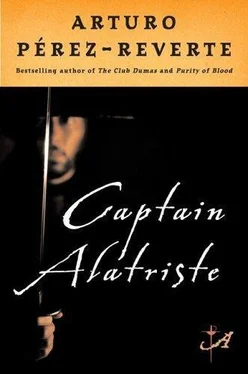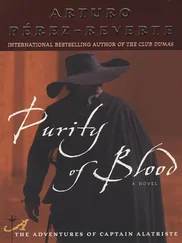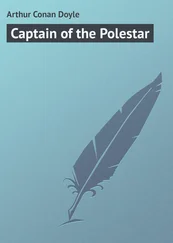"Well," he said slowly. "I was waiting for him too. To give him a gift. But I have just been told that my gift is no longer necessary ... at least for the moment... . They are releasing him sine die?
The distrust on my face was so clear that the Italian burst out laughing, a laugh that sounded like wood splintering: crackling, coarse.
"I am going now, boy. I have things to do. But I want you to do me a favor. A message for Captain Alatriste. You will give it to him?"
I continued to watch him distrustfully, but did not say a word. Once more he looked over my shoulder, and then to either side, and I thought I heard him sigh very slowly, as if deep within. There, motionless, dressed all in black, beneath the rain that was steadily growing heavier, he too seemed tired. The thought flashed through my mind that perhaps evil men tire, just as loyal, feeling men do. After all, no one chooses his destiny.
"Tell your captain," said the Italian, "that Gualterio Malatesta has not forgotten that there is unfinished business between us. And that life is long—until it ends. Tell him, too, that we will meet again, and that on that occasion I hope to be more skillful than I have been till now, and kill him. With no heat or rancor, just calm, and with as much time as it takes. In addition to being a professional matter, this is personal. And as professional to professional, I am sure that he will understand perfectly. Will you give him the message?" Again that bright slash crossed his face, dangerous as a lightning bolt. "By my oath, you are a good lad."
He stood there, absorbed, staring at an indeterminate point in the shimmering gray reflections of the plaza. He made a move as if to leave, but stopped short.
"That other night," he added, still gazing toward the plaza, "at the Gate of Lost Souls, you did very well. Those point-blank pistol shots. Dio mio. I suppose that Alatriste must know that he owes you his life."
He shook the droplets of water from the folds of his cape and wrapped it tightly about him. His jet-black eyes finally stopped on me.
"I imagine that we will see each other again," he said, and began to walk away.
But after only a few steps, he turned back toward me. "Although, you know what I should do? I should finish you off now, while you are still a youngster. Before you become a man and kill me!"
Then he spun on his heel and walked away, once again the black shadow he had always been. And through the rain, I heard his laughter growing faint in the distance.
A SELECTION FROM
A POETRY BOUQUET
BY VARIOUS LIVELY
MINDS OF THIS CITY
Printed in the XVII century, lacking the printer's mark, and conserved in the Nuevo Extreme? Ducal Archive and Library, Seville
ATTRIBUTED TO DON FRANCISCO DE QUEVEDO
In Praise of Military Virtue in the Person of Don Diego Alatriste
Sonnet
You, Diego, whose sword so nobly defends
The name and honor of your family,
As long as you are blessed with life to live,
You will battle every enemy.
You wear the tunic of an old brigade,
And with God's help, you wear it without stain.
Your scruples are so uncompromising
That you will never let it be profaned.
Courageous on the bloody battlefield,
In days of peace, still more honor you acquire.
And in your heart and mind there breathes such fire
That to empty boasting you will never yield.
In your faith and constancy you are so strong
You will embody virtue your whole life long.
On the Same Subject in the S atiric Mode
De cima
In Flanders soil he drove a pike.
He drove even more, to wit,
He drove a Frenchman to take flight,
Screaming that he'd been badly hit.
Oh, he made a sorry sight.
Piteous how that man ran.
A foe may suddenly appear,
But I find I have naught to fear:
For in Ghent there is no better man
Than Alatriste, our brave capita n.
CONDE DE GUADALMEDINA
On the Sojourn of Charles,
Prince 0f Wales, in Madrid
Sonnet
As he would win the fair infanta's hand,
The Prince of Wales came boldly to her land.
Whereon he found that such an enterprise
Is won not by the rash, but by the wise.
To win his suit, he swooped down one fine day,
Like an eagle, certain of his prey,
But found a troth, alas! will have no weight
When abrogated by affairs of state.
Thus Charles learned about diplomacy:
In the rough seas of the Spanish court
The most dauntless pilot may be brought up short.
As a dashing prince, similarly,
Will not wear upon his brow the wreath
Unless he persevere to his last breath.
FROM THE SAME HAND
To the Lord of La Torre de Juan Abad
with Similes from the Lives of the S aints
Rhymed octave
Behind good Roch, lame supplicant,
Behind Ignatius, chivalrous and valiant.
Behind Dominic, in combating a Protestant,
Behind John Chrysostom, so famously eloquent,
Behind Jerome, in learning and Jewish cant,
Behind Paul, the tactful and prudent,
Finally comes Quevedo, behind even Thomas,
And for every target, he brings his harquebus.










